Shuiyuan Theatre unveiled as first repertory troupe in Taiwan
By Psyche Cho Located on the 10th floor of the Shuiyuan Market building in the bustling Gongguan area and overlooking National Taiwan University, the theatre was formerly an auditorium used for physical examinations for draftees during the past few decades. In 2009, in compliance with the "Gongguan Riverside" scheme initiated by the Taipei City Government (TCG), the venue was hence transferred and incorporated into the mechanism of the neighborhood under the administration of the Department of Cultural Affairs, Taipei City Government. The transfer in usage, according to Liou Wei-gong, Commissioner of the Cultural Department, is "making the most use of the unused venue" after the unveiling ceremony of the theatre on May 1. Though it is planned as a repertory theater, Shuiyuan Theatre welcomes not only repertory programs and short-term performances, it hope to find other ways to exert its presence to the greatest extent possible. Well aware that the high cost of securing a venue and maintaining standards cause many troupes to go under, the regulations regarding applications have been loosened in an effort to encourage a wider variety of performances. In order to maximize opportunities to perform and stimulate interest among the arts consumer population, applications for use of the theater should be limited to performing arts like music, dance and theater. "We are aware of a trend to linking tourism to theatrical performances," said Liou. Thus repertory programs are planned to target visitors from other countries. As a keen cultural observant Liou has noticed a discrepancy in the program genres favored by local theater goers and tourists. Despite the discrepancy, the programs arranged for the theater will not focus on showcasing the charm of Taipei only, but rather certain theatrical themes. "The most important part will always be troupes and culture," noted Liou. "Operating a repertory theatre is a must-do for the government," said Liou. He continued that the ultimate goal will be setting up more performing venues for long-term repertory programs in Taipei, as "performing art is the most critical strength in Taipei, exceeding any other presentation format." A production adapted from the classic work A Streetcar Named Desire will precede all others as the first show go on stage at Shuiyuan Theatre May 4 to 6. Desire Web 2.1, written and directed by award-winning playwright Wu Luo-ying, delves into the nature of humanity and how it is maneuvered by endless desires. Composed by US playwright Tennessee Williams in 1947, A Streetcar Named Desire deals with cultural clashes. "The original text features a strong theatrical tension that offers a very joyful and restraint-free viewing experience for audiences," she said. Wu's interpretation of the masterpiece bears her signature trait of portraying characters in a profound way while casting a deeper look at the dark side of humanity. "When humans are manipulated by desires, our souls are restricted and enslaved," noted Wu, explaining the name of the drama. Wu is a core member of the Taiwan Artists' Troupe, founded in 1996, and the troupe is highly creativity-oriented and boasts a star-studded staff. Many of the versatile members are now active in drama or filming sector, like Leon Dai. A recognized playwright herself, Wu has written several award-winning works including the television drama series "The Hospital" and "Black & White". Wu attributes her success to substantial training in theater, which she believes is the source of creative energy. Having noticed that there are seldom introductions to classical theatrical works in Taiwan, Wu was stimulated to shoulder the task of writing one, presenting her own creation this time. In addition to paying tribute to the master, arranging the production is a challenge for Wu. "It is like a process to check and prove something—things I've gone through and didn't quite understand when I was young," she said. One feature that makes Shuiyuan Theatre stand out from other companies is the out-thrust layout of the stage. The protrusion presents three different viewing angles. "It's like a movie shot from various angles," Wu noted. College production Fulfilling its mission to encourage performing groups, the second show scheduled to go on stage for May 18 to 20 will be a black comedy presented by Department of Drama and Theatre from National Taiwan University (NTU), which sits just opposite the theatre. The Lieutenant of Inishmore, a work written by Irish playwright Martin McDonagh, also explores the nature of humanity—only escalated in strength. In this college version, the concept of in-yer-face theatre is employed in stage design, presenting shocking and bloody scenes directly in an attempt to challenge audiences. "The thrust stage offers potential for experimental theaters," said Hsieh Hsiao-mei, Associate Professor at the Department. She continued that "the theatre serves as a new place for NTU faculty and students to enjoy theater performances." Rejuvenated Shuiyuan Market Yet the original exterior of the building lost its sense of harmony with the streets and surrounding structures after the extensive renovation that has been carried out in the neighborhood. Shuiyuan Market wraps the theatre in a bright blue landmark standing in central Taipei. It's a magic act performed by internationally-renowned Israeli artist Yaacov Agam through a redecorating project. Agam has further installed the world's largest square polymorph design, called "Heart of the Fountainhead," on the exterior of the market. This symbol of the diverse culture of Taipei uses a total of 177 different colors and new materials in consideration of the frequent rain and high humidity in Taiwan. "We live in our cities surrounded by visual aggression. In Taipei, this aggression is accompanied by very visually ugly and repulsive air conditioning units," says Agam. His cooperation with Taiwan dates back in 2009 when he erected colorful columns titled 'Message of Peace' at the Main World Games Stadium in Kaohsiung. The surrounding neighborhood is abutted by several of Taiwan's leading higher educational institutes like National Taiwan University, as well as alternative bookstores such as Fembooks. There are also a number of music spots offering experimental styles, including the Riverside Music Café, Witch House and The Wall Live House.
Staff Reporter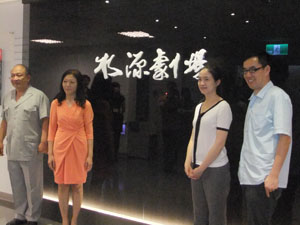 A city's soft power lies in its charm, derived mostly from culture and art. To strengthen such a force, however, requires not only long-term cultivation of talents but a substantial facility to present performances as well. Shuiyuan Theater, Taiwan's first repertory theater designed for regular performances, is designed to serve such a purpose and is expected to become a tourist attraction as well as a venue for showcasing Taipei's culture and creativity.
A city's soft power lies in its charm, derived mostly from culture and art. To strengthen such a force, however, requires not only long-term cultivation of talents but a substantial facility to present performances as well. Shuiyuan Theater, Taiwan's first repertory theater designed for regular performances, is designed to serve such a purpose and is expected to become a tourist attraction as well as a venue for showcasing Taipei's culture and creativity. 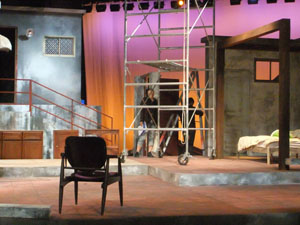 "For the time being, we're at the testing phase," said Liou. At the start, they face challenges such as funding and have to make adjustments in response, he said.
"For the time being, we're at the testing phase," said Liou. At the start, they face challenges such as funding and have to make adjustments in response, he said.
Adaptation of "A Streetcar Named Desire" as forerunner 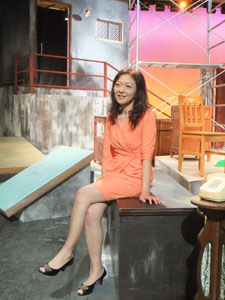 In the adaption version, the background is moved to a Chinese-speaking area and nonspecific in space and time. Plots will be gradually unveiled through the recall of the female protagonist, noted Wu.
In the adaption version, the background is moved to a Chinese-speaking area and nonspecific in space and time. Plots will be gradually unveiled through the recall of the female protagonist, noted Wu. 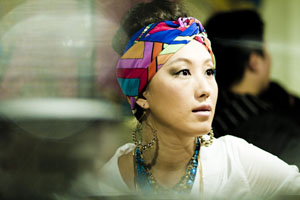 The theater's appropriate distance between actors and audience also makes it an ideal choice for presenting dramas in a rather complete setting. "Not too close to the audience like in small theaters, and not so far from them that interaction is impossible, the scale of Shuiyuan Theatre is just right for a medium-scale performance," said the director.
The theater's appropriate distance between actors and audience also makes it an ideal choice for presenting dramas in a rather complete setting. "Not too close to the audience like in small theaters, and not so far from them that interaction is impossible, the scale of Shuiyuan Theatre is just right for a medium-scale performance," said the director. 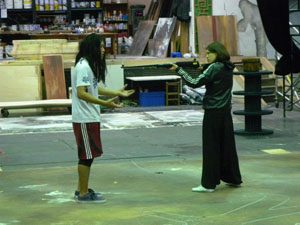 Like its identity as one of Taipei's oldest markets, Shuiyuan Market is known as a dusty earthen yellow building that is hardly connected with anything modern or stylish.
Like its identity as one of Taipei's oldest markets, Shuiyuan Market is known as a dusty earthen yellow building that is hardly connected with anything modern or stylish.

![Taiwan.gov.tw [ open a new window]](/images/egov.png)
